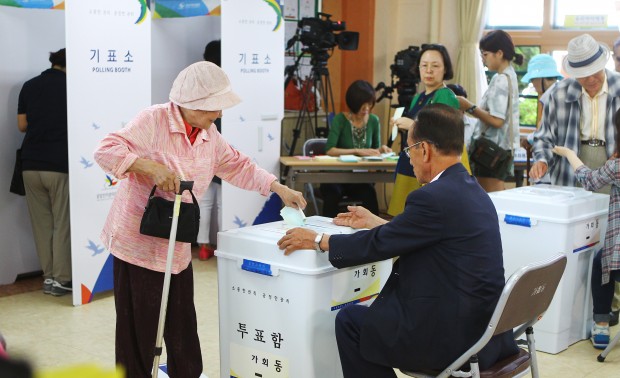South Korean parties may lower voting age to 18

A woman casts a ballot for local elections at a polling station in Seoul, South Korea, June 4, 2014. (Xinhua/Yao Qilin)
Rival parties are in talks to lower the voting age by one year to 18.
National Assembly speaker Chung Ui-hwa said Wednesday that parties are holding negotiations to increase the number of eligible voters by lowering the voting age.
“They are talking about lowering the voting age to 18,” Chung said during a press briefing. Currently in South Korea, those who are 19 or older have the right to vote.
“Korea has become an advanced nation and developed economy. Considering nearly every OECD member nation sets the voting age at 18, I believe we should start a discussion from the upcoming election.”
If the voting age is lowered, the number of eligible voters will increase by about 450,000 to 43.72 million from 43.27 million as of the end of last year, according to the National Election Commission.
He cited South Korea as the only country that limits the voting age to 19, while the remaining 32 OECD nations allow voting from age 18 with the exception of Poland where it is 20.
The remark came a day after the speaker had a meeting with the leaders of the ruling Saenuri Party and the opposition New Politics Alliance for Democracy (NPAD) seeking a breakthrough in the overdue talks on redistricting the electoral map ahead of April’s general election.
The rival parties failed to reach an agreement, as they are at odds over how to adjust the ratio of elected parliamentary seats to proportional representation ones.
Chung said during the meeting he suggested that the ruling party should positively consider a proposal from the NPAD to lower the voting age.
“The NPAD proposed both lowering the voting age and supplementing the proportional representation system,” he said. “I think the ruling party should consider the former proposal as an exchange for passage of economic bills.”
The Saenuri Party and the government have pushed for the passing of a series of economic bills, claiming it will boost the stagnating economy.
The NPAD has argued that those who are 18 are mature enough to vote and should be allowed to weigh in on political issues. The plan was viewed as a tactic to raise support in the elections by the opposition camp.
(This article was originally published on The Korea times)



















































